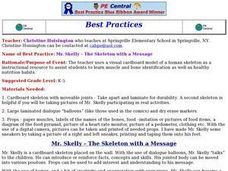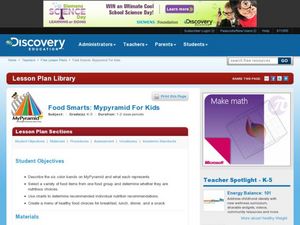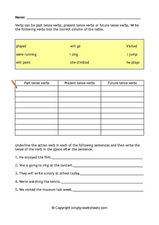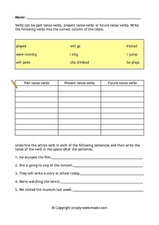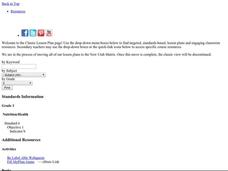Curated OER
Small Group Counseling
Learners participate in small group counseling sessions to solve a common issue. As a class, they define anger and note the characteristics of the warning signs. They discuss different ways of dealing with their anger and how to use...
Curated OER
ESOL: Health and Nutrition
Students explore the four food groups and how they contribute to one's health. They identify the four food groups and create a poster of the four food groups with pictures. They present their posters to the class and practice answering...
Curated OER
Health: The Skeleton with a Message
Students identify human muscles and bones from a cardboard skeleton, named "Mr. Skelly." Using dialog balloons as props, the teacher holds up advice from Mr. Skelly, such as noting he drinks milk to keep his bones strong. The lesson...
Curated OER
Food Smarts: Mypyramid For Kids
Students create a menu based on the nutritious choices they pick out from MyPyramid and the video they watch. In this nutrition lesson plan, students describe what each color band on the pyramid represents, use charts, discuss nutrition...
Curated OER
Impact!!
Students perform a science experiment. In this algebra lesson, students collect data from their experiment and create a graph. They analyze the graph and draw conclusion.
Curated OER
It's A Jungle in Here!
Fifth graders research rainforest destruction. In this geography and ecology lesson, 5th graders work as a group to research the effects of logging, farming, and mining on the rainforest. Students gather and display data and information...
Curated OER
Verbs & Tenses
Students illustrate known tenses with tense clue words. They select a range of verbs. Teachers divide the class into teams. The idea is for each team to make the longest and perfectly constructed sentence. Words and scores are tallied on...
English Club
Verbs & Tenses
Students in an ESL classroom practice using verbs and the correct tense. In teams, they work together to make a sentence using the same verb and tense clue word. They read their sentences aloud and gain points on the correctness of it.
Curated OER
Health and Hygiene
Students examine hygiene and health practices today. For this health science lesson, students research medieval treatments to ailments common today. They evaluate how effective herbal remedies are in treating diseases.
Curated OER
Real Attractive
Sixth graders create a collage of attractive people. They write about what makes these people attractive. They discuss what makes someone attractive. They research eating disorders and how the media impacts what people deem as attractive.
Curated OER
Behavior Assessment & Nutrient Needs
Students identify the factors that influence eating behaviors. They discover the nutrients that are needed in a teenager's body. They also identify the major food groups and examine the food pyramid.
Curated OER
Eating, A Family Affair
Students explain the benefits of eating together as a family. In this adult health lesson, students share their happy mealtime experience with each other. They develop a mealtime goal for their family.
Curated OER
Healthy Snacks
Ninth graders examine teen attitudes towards snack food merchandising in schools and what contributes to successful food merchandising. The context for the lesson is found in the research conducted from the Health Canada Website.
Curated OER
Food Pyramid Picnic
Second graders discuss the food pyramid and appropriate choices for each food group. They plan a nutritional meal for a picnic lunch and make a class book. As a culminating event, the class plans and enjoys a picnic.
Curated OER
Helping Occupations
Second graders discuss careers that help students and write these in their handout.
Curated OER
Eat Your Sprouts Part I
Students will conduct a lab on the oxidation of an apple. The students will learn that the oxidation process can be halted when lemon juice is applied to the flesh of an apple because the lemon juice contains vitamin C, an antioxidant....
Curated OER
Hands of Doom
Students discuss the four essential step used for safe food handling: clean, separate, cook, and chill. They identify the bacteria that can cause food poisoning, practice how to properly wash hands before and after handling food,...
Curated OER
Grocery Store Problem Solving
Third graders practice mathematical problem solving skills. In this problem solving instructional activity, 3rd graders develop mathematical problem solving skills using real-world examples.
PBS
Pbs: Scientific American Frontiers: Teaching Gude: Healthy Choices
Through this activity, high school students keep track of what they eat everyday and compare their nutrient intake with the minimum requirements for good health.
Children's Museum
The Children's Museum of Indianapolis: Health House: Food, Fitness and Fun: 24/7
Engage your students in what it means to live a healthy life. They'll learn how to read food labels and understand basic nutrition. They'll take part in fun active play and learn about exercise benefits. Learn why healthy habits such as...
PBS
Pbs Teachers: Fat: Obesity, Eating Habits and Weight Loss
Evaluate current guidelines for a healthy diet, compare them to one's own eating habits and learn safe behaviors for maintaining a healthy weight. Analyze the food pyramid, fast-food and health-food nutrition and the causes of obesity.
Alabama Learning Exchange
Alex: It's Great to Be Me!
This lesson addresses the similarities and differences among people. Incorporating the literature of Eric Carle and a virtual field trip focusing on healthy habits and the five senses, students will have a greater sense of their...
Alabama Learning Exchange
Alex: Eat, Drink, and Be Healthy
In this lesson, students evaluate their eating habits, focusing on the ways in which one can assess whether or not his or her diet is nutritious. Students will work in small groups to design a menu for a healthy lunch and write a...
PBS
Pbs Learning Media: Lesson 1: Where Are the Soda Trees?
Using film clips from In Defense of Food and a team activity, students explore healthy eating habits. Students get excited about becoming food defenders and begin learning how to differentiate between food (whole and minimally processed)...


